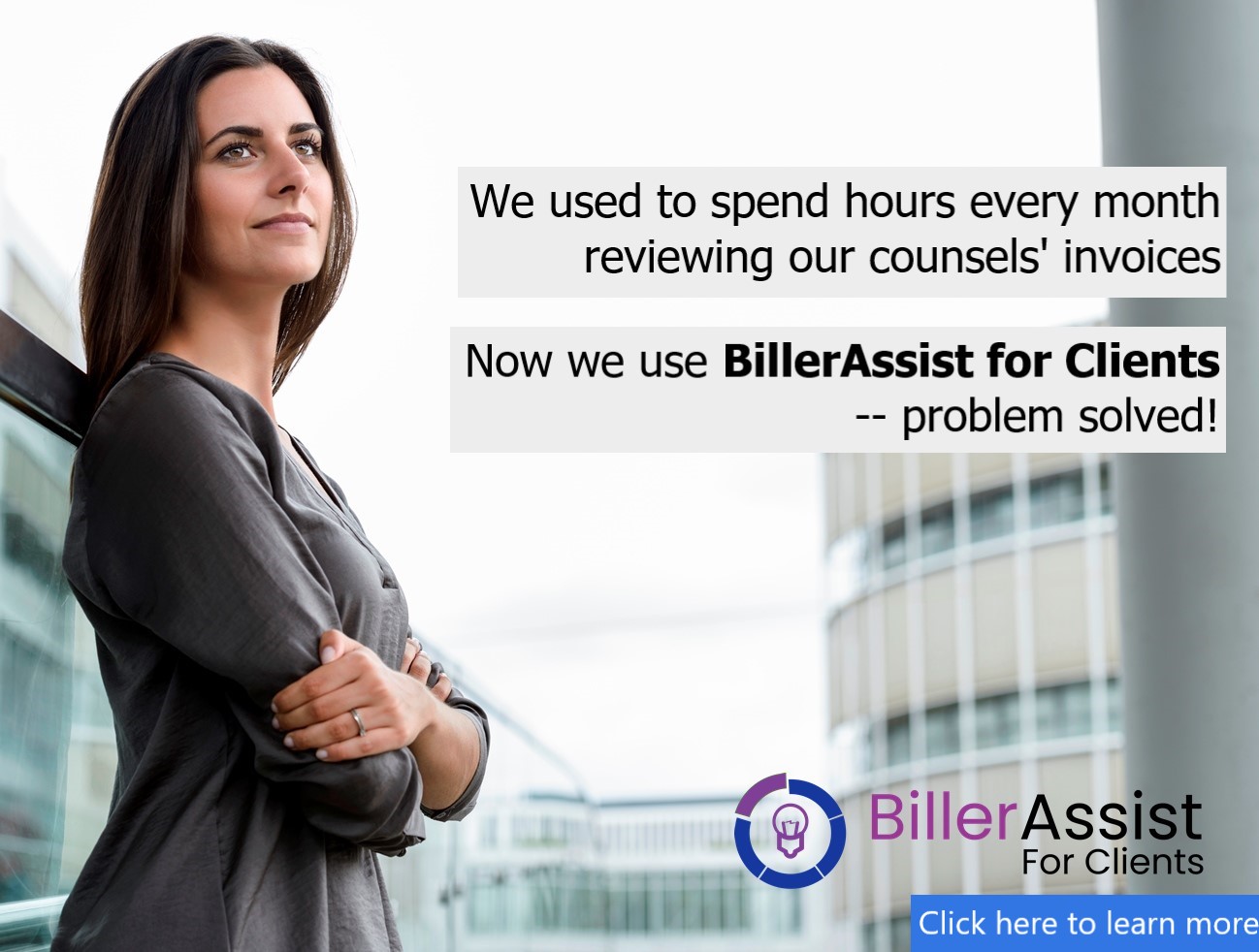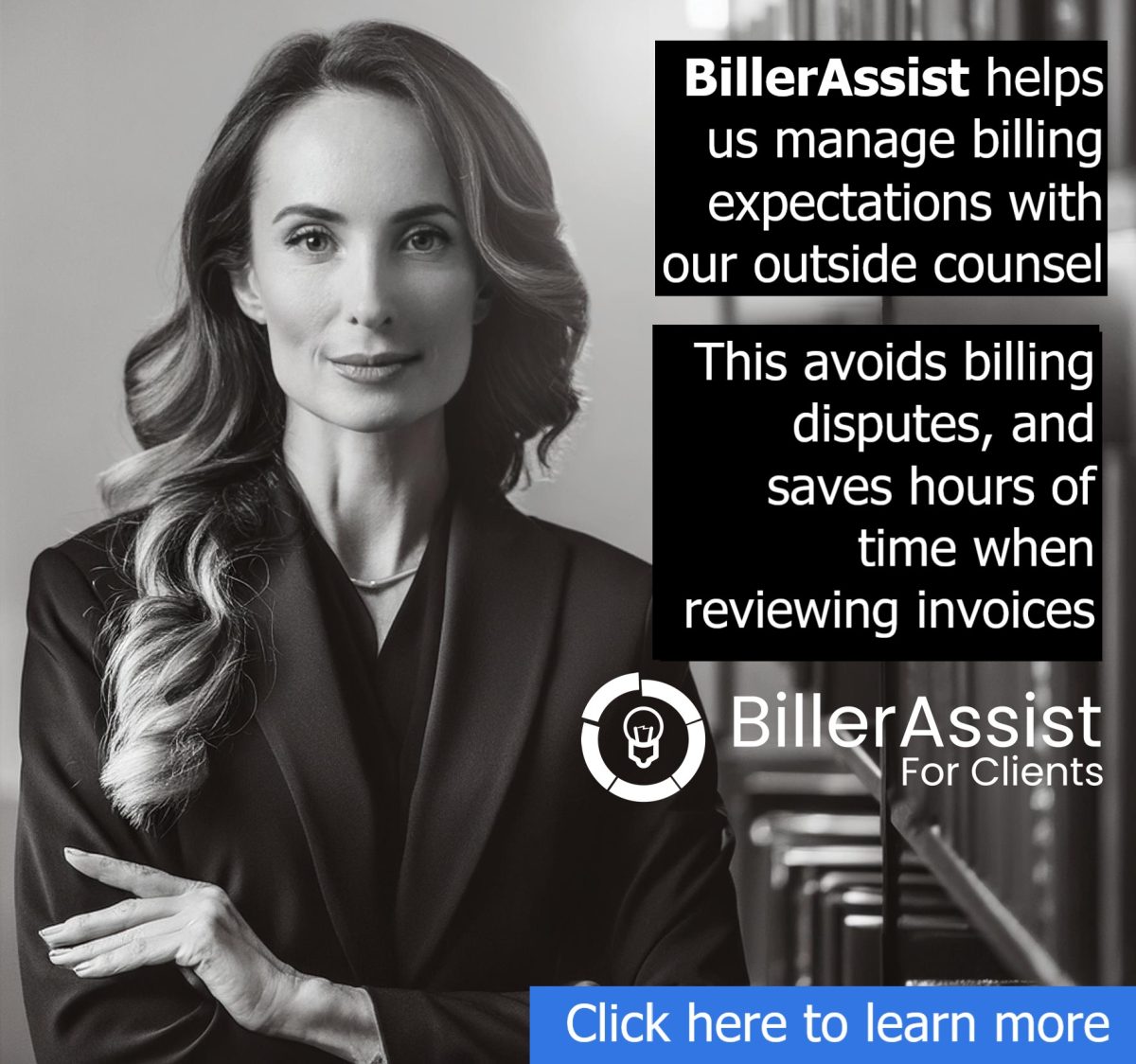Legal Spend Management: Using AI to Communicate Billing Expectations and Reduce Friction
One of the primary goals of any effective legal department should be to increase productivity and reduce unnecessary effort, just as with any other department of a business.
Working with outside counsel can be a substantial impediment in striving to maximize efficiency, in large part due to misplaced expectations and similar miscommunications.
Legal spend management in particular is often a significant source of inefficiency.
Data-driven and AI-powered solutions can be leveraged to improve both efficiency and transparency in the billing process. These solutions aid in improving communications between in-house and outside counsel, especially with regard to billing and matter management.
Real-time checking of Outside Counsel Guidelines compliance, reasonableness of fees and expenses, and uniform application of billing codes, can all be achieved with currently available legal technologies, all while making the time-consuming task of legal spend management easier and more efficient overall.
The Nature of the Problem
Overly lax management of legal expenditures can lead to runaway expenses, while overly tight oversight can wreak havoc on in-house and outside counsel relationships. Although it can be seen as a necessary evil, the task of reviewing outside counsel invoices can take up a lot of time and effort.
A common method of attempting to reduce the legal spend management burden is to use “Outside Counsel Guidelines” to help standardize the billing process. Setting and adhering to previously agreed-upon billing rules and guidelines is a great way to move toward getting everyone on the same page and keeping them there.
The use of Uniform Task-Based Management System (UTBMS) or similar billing codes can further improve the process. Coded billing entries are easier to use for data analysis purposes.
In fact, task-based billing with UTBMS codes and Outside Counsel Guidelines are most often meant to help manage billing expectations and avoid irregularities. Billing disputes should be minimized, if not completely eliminated, if everyone follows the strategy in a uniform and consistent manner.
However, Outside Counsel Guidelines should be carefully tailored to achieve the goal of greater efficiency. Setting arbitrary guidelines for outside counsel might make things even more difficult for the in-house counsel in charge of them.
In addition, arbitrary or idiosyncratic application of Outside Counsel Guidelines can also be self-defeating.
For example, one legal department employee might have much different sensibilities as to the reasonableness of certain fees and expenses than another. Moreover, different in-house employees may treat specific types of rules – such as “no block billing” – inconsistently.
This can actually lead to more confusion, disputes, and overall time spent on the process.
Legal Spend Management: There's an App for That
Fortunately, with the correct technologies in place, achieving real-time communication and clarity as to billing requirements and expectations between in-house and outside counsel can be a breeze.
Uncertainty is drastically reduced when standardized billing automation is used.
Immediate and real-time notifications and flags presented to outside counsel prevent errors and inconsistencies at the source. Providing the same flags and notifications for in-house employees in the invoice review process ensures consistency.
This transparency and real-time communication keeps everyone honest, and maintains expectations more effectively than depending on potentially idiosyncratic and inaccurate human review.
With automation, every invoice follows the same set of standards and procedures, with no quirks or discrepancies from person to person, or from firm to firm.
The more consistent format and appearance of billing entries makes them easier to review. In addition, uniformity and consistency in the application of billing codes is crucial in the organization and analysis of billing data.
Automating the application of UTBMS or other billing codes ensures that each of every billing entry follows exactly the same coding methodology. Additionally, the automated part reduces human error, which is necessarily more common in idiosyncratic manual processes.
Ensuring Outside Counsel Guidelines compliance, reasonableness of fees and expenses, and uniform application of billing codes all work together to eliminate the potential of excessive charges and ambiguity in billing entries.
Indeed, according to a recent Thomson Reuters analysis, implementing automated billing platforms can result in a considerable reduction in legal expenditures as well as billing disagreements.
The Importance of Real-Time Communication
Billing entries are ideally made in real-time, as an attorney or other timekeeper performs the underlying work. Moreover, it is common practice for outside counsel to review invoices carefully before submitting them for payment, and Outside Counsel Guidelines often make this pre-billing review mandatory.
Communicating billing requirements and expectations at the time the entries are being made, or at least during the pre-billing review process, prevents billing errors and inconsistencies at their source. The sooner the problem is identified, the sooner and easier it may be resolved.
Clear flags and notifications allow outside counsel to correct potential issues quickly. Such real-time communications also help outside counsel to avoid excessive work or expenses, before their expenditure becomes a problem.
Because of AI-assisted billing technologies, this capability is now a reality.
Automated legal billing review offers more than just transparency. According to the Thompson Reuters, automated billing allows for a faster billing review process, which speeds up a significantly time-consuming task.
Often, this does not even require changing to a new system. When artificial intelligence (AI) and machine learning technology are used to enhance existing invoicing and matter management platforms to better monitor and control legal costs, efficiency, productivity, and billing transparency all improve significantly.
Outside Counsel Can Help
It is not just the responsibility of in-house counsel to establish a positive relationship with their outside counsel counterparts. The relationship is very much a two-way street.
The American Bar Association, for example, gives some advice on outside counsel billing practices. In addition, outside counsel must abide by their ethical and professional responsibilities, such as following the ABA Model Rules of Professional Conduct that are required in most jurisdictions.
In fact, one of Law.com's “10 Tips to Strengthen Relationships with Outside Counsel" is “creating trust — at all levels."
Technology to improve transparency with your outside counsel billing isn't a pipe dream. It exists and is currently available.
There are programs for outside counsel law firms that use the most recent advances in artificial intelligence and machine learning to standardize law firm billing data, with features such as with UTBMS code automation, excessive charge flagging, and Outside Counsel Billing Guidelines compliance automation.
The benefit of these applications is that they allow for automated billing entry review. That means that, if outside counsel use these available technologies, their clients won't have to do in-depth and time-consuming analysis for each and every invoice.
Outside counsel can also be notified in advance of invoicing concerns, including the specific location of the prospective problem.
With these technologies, outside counsel will be notified in real time if they are violating their client’s billing guidelines or charging too much for a specific assignment or for the entire matter, thanks to automated flags.
Outside counsel are automatically alerted to inconsistencies by the intuitive software before submitting non-compliant invoices.
Furthermore, it would be unreasonable to expect outside counsel to ignore the billing infrastructure they currently have in place.
Thankfully, some of the tools that employ machine learning and AI for automated invoice assessment already interact with the most common invoice formats and law firm billing software systems. Rather than completely replacing outside counsel's billing platforms, some of these tools serve as enhancements.
Many tech-savvy law firms have already begun incorporating this technology into their invoicing systems.
The more law firms that do so, the less space there will be for those who choose to lag behind. In the near future, failing to use such beneficial and easily available materials may even start to run up against ethical competence norms.
Conclusion
Legal departments should take advantage of any chance to raise productivity, enhance efficiency, and encourage transparency in non-billable jobs. That is exactly what the upgraded billing systems with machine learning and artificial intelligence give.
These AI-powered apps are speedier, less prone to human mistake, and use standardization to bring everyone on the same page. Tasks that used to take hours may now be completed in seconds thanks to the digital world.
Billing should not be a subject of conflict between in-house and outside counsel, no matter how crucial it is. Automating and standardizing the whole billing process is a practical strategy to avoid it becoming a problem.
This automatic standardization also provides for near-unprecedented levels of billing transparency, allowing in-house lawyers to collaborate with their law firm counterparts more quickly and consistently.
When in-house and outside counsel don't have to worry about billing disparities and disputes, the relationship can be significantly smoother and more mutually beneficial.
Because some of the apps that employ this technology integrate easily with current invoicing and matter management platforms, and can be set up in under 5 minutes, they reduce the amount of change management that outside counsel and clients have to deal with.
Time spent on legal spend management can now be reserved for other important issues.






